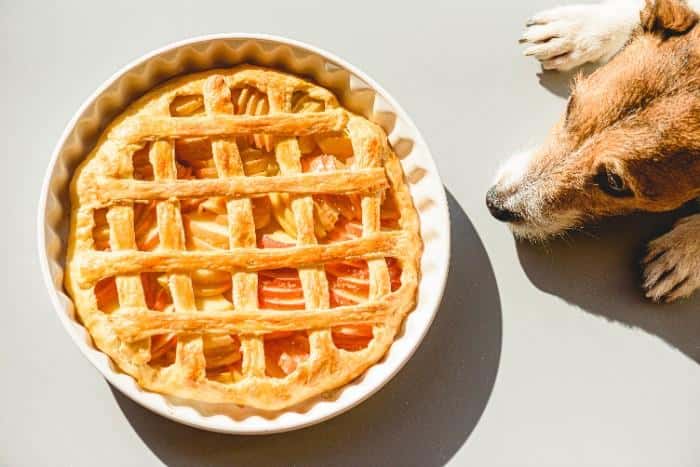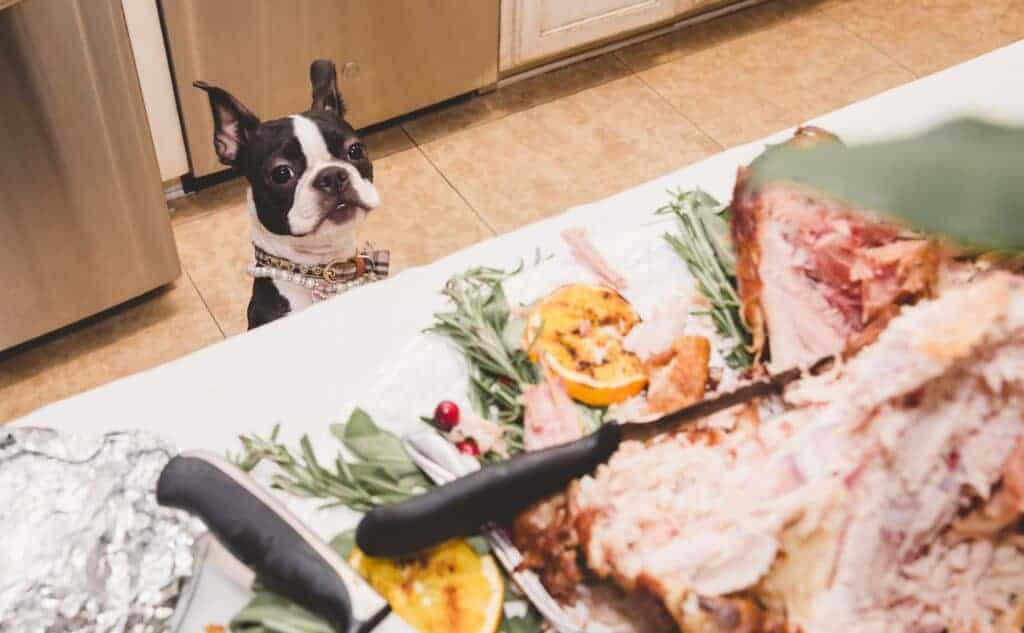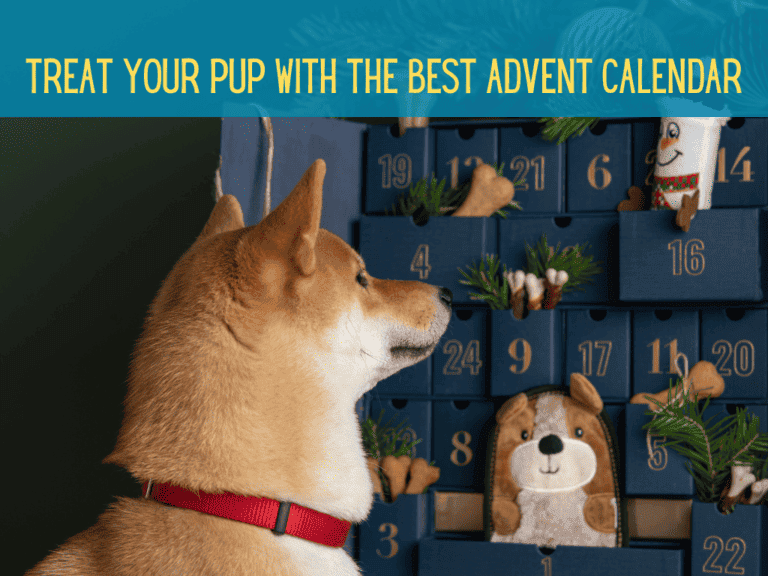Thanksgiving Food for Dogs: Safe Choices & What to Avoid

Did you know that Thanksgiving doesn’t have to be just for the humans? While we indulge in traditional Thanksgiving delights, we can actually include our beloved pets in the festivities. But what’s okay and what’s not okay for dogs to eat?
That’s what this blog post is all about! Dive in to discover which Thanksgiving foods for dogs are safe and which ones to avoid giving your pup. Let’s ensure your four-legged family member has a festive and delightful holiday feast!

Safe and Healthy Thanksgiving Food for Dogs
If you want to include your dog in your holiday, consider making a plate with these safe dog foods.
Plain, Boneless Turkey Meat
Turkey is not only a favorite among many humans during Thanksgiving, but our dogs also find it quite delectable. When feeding your dog turkey, opt for the plain, boneless parts. The skin should be removed, as its fatty content might prove challenging for a dog’s digestive system.
No spices or seasonings! Keep it simple.
Sweet Potato
Sweet potatoes are a great source of nutrition, with a rich profile of vitamins and minerals that benefit dogs. When serving sweet potatoes to your pet, keep them plain. Refrain from enhancing them with ingredients like butter, sugar, or spices. Their natural sweetness makes them a delightful treat for most dogs.
Pumpkin
Pumpkin is an excellent source of dietary fiber for dogs, aiding their digestive health. If you’re contemplating introducing pumpkin pie to your dog’s Thanksgiving menu, make sure it’s prepared from a dog-friendly recipe. This means skipping on ingredients like condensed milk, excessive spices, whipped cream, and other additives that could disrupt their stomach.
Canned pumpkin works just as well as freshly prepared pumpkin and can easily spread on a lick mat!
Green Beans
When served plain, green beans can be a fantastic addition to your dog’s meal. These little greens are low in calories and brimming with fiber. This dual benefit can help manage your dog’s weight while also promoting a healthy digestive system.
Carrots
Carrots are more than just a colorful addition to dishes. When given to dogs, these crunchy treats offer a plethora of vitamins and minerals. As an added perk, munching on carrots can assist in cleaning their teeth, promoting dental health.
Cranberries
Often overlooked, cranberries are packed with health benefits, especially when it comes to supporting the urinary system in dogs. When introducing cranberries, ensure they’re fresh and free from added sugars or preservatives.
Remember, moderation is the key. Always observe your dog after introducing new food to avoid adverse reactions.

Thanksgiving Foods to Avoid
Avoid these foods to prevent serious issues with your pup, such as pancreatitis, diarrhea, blockages, or other more serious conditions that could harm your companion.
Turkey Skin, Bones, and Fat Trimmings
While turkey’s lean meat is safe for dogs, the skin, bones, and fat trimmings are problematic:
- The skin’s high-fat content can disrupt their digestion.
- Turkey bones splinter when cooked, potentially leading to choking or severe gastrointestinal issues that can be fatal.
- Fat trimmings often cause digestive disturbances, leading to pancreatitis.
Mashed Potatoes
Mashed potatoes in their purest form—simply potatoes mashed—are generally okay for dogs. However, the seasonings and additives that give them the flavor we love can upset a dog’s stomach. If you remember to reserve some plain mashed potatoes before adding the good stuff, then a small amount is safe to give your dog.
Onions and Garlic
Onions and garlic are dangerous for dogs, as they contain compounds that can lead to significant organ damage when ingested in considerable amounts. As a rule of thumb, refrain from offering foods that might be seasoned with these ingredients.
Stuffing
Stuffing usually contains several ingredients, including onions, garlic, and spices. While these additives enhance its taste for us, they can harm our canine companions. It’s best to avoid this dish altogether!
Corn Cob
Corn kernels can be a delightful snack for dogs. However, the cob is a different story. Cobs don’t break down in the digestive tract and are notorious for causing obstructions. If corn is on your dog’s menu, ensure it’s off the cob… Unless you want a hefty vet bill.
Chocolate
While most of us relish chocolate, dogs are not allowed to eat it. Chocolate contains Theobromine, a compound hazardous to dogs. Small amounts can induce symptoms like vomiting and tremors, while larger quantities can be life-threatening.
Xylitol
Xylitol is an artificial sweetener in many products, which is extremely dangerous for dogs. Even minimal amounts can have fatal consequences. Always double-check ingredient labels before offering any treat to your pet.
If a product is labeled “sugar-free,” triple-check it for xylitol!
Coffee
Our morning pick-me-up contains caffeine, a substance that’s toxic to dogs. Signs of caffeine poisoning in dogs can look like panting, an accelerated heart rate, and excessive agitation.
Alcohol
Under no circumstances should alcohol be given to dogs. It can induce symptoms ranging from vomiting and diarrhea to tremors. In grave scenarios, it might even be fatal.
Grapes and Raisins
Although tiny, grapes and raisins pack a punch of danger for dogs. Their consumption can lead to kidney failure. Even minor amounts can have severe implications, so it’s best to exclude them entirely.
When celebrating with food, always keep your dog’s safety in mind. While sharing is a gesture of love, ensuring what you share is safe is the ultimate act of care.
Help! My dog ate something toxic.
Don’t wait! Contact the Pet Poison Helpline and consult your trusted veterinarian.

Mind the Portions!
As the festive spirit of Thanksgiving is upon us, it’s natural to want to include our furry friends in the feasting. However, moderation is key, as overindulging can cause immediate digestive discomfort and contribute to long-term health concerns such as obesity and pancreatitis in dogs.
While the occasional treat might seem harmless, regularly offering table scraps can result in undesired behaviors. Continuous handouts can train your dog to expect, or even demand, food whenever you’re eating, leading to persistent begging, counter surfing, or other poor behaviors. So, as you share, be mindful of the quantity and consistency. After all, showing restraint is another way of showing love.
Bottom Line
Navigating the dos and don’ts of Thanksgiving foods for dogs ensures that everyone can enjoy the holiday safely and happily. Remember, while sharing this special time (and a little bit of turkey) with your furry family member is a joy, their health and well-being should always come first. Being mindful of what’s on their plate as much as yours this Thanksgiving will help avoid any unwanted trips to the vet and keep the holiday spirit alive for everyone.
As we gather around the table this year, let’s give thanks for the companionship and love our dogs bring into our lives. And by keeping their meals safe and dog-friendly, we’re showing our gratitude in one of the most important ways possible.
Hungry for more tips on keeping your dog healthy and happy, during the holidays and beyond? Dive into a world of expert dog care advice with me. Subscribe to my newsletter for the latest on safe dog nutrition, festive treat ideas, and everything you need to know to keep your furry friend thriving.
Join the Pack!
Sign up for my newsletter and fetch the latest tips, tricks, and industry insights straight to your inbox!
Enjoy every moment of this special holiday alongside your loyal companion. Remember, safety first! Looking for more ways to include your best friend in holiday traditions? Consider an advent calendar for dogs!






